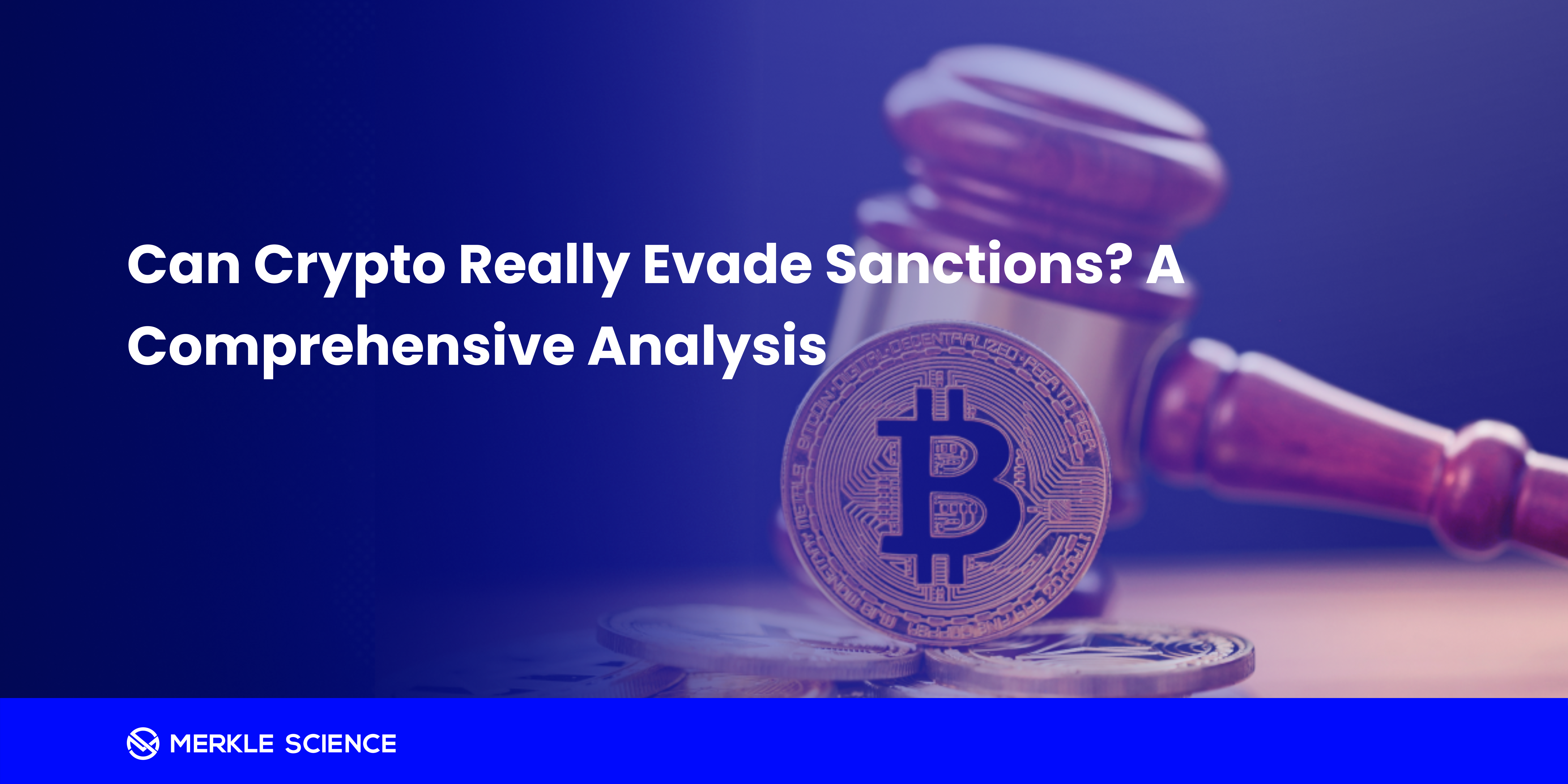Can Crypto Really Evade Sanctions? A Comprehensive Analysis

Mriganka Pattnaik

To briefly answer the titular question, while crypto has been used for sanctions evasion, it is increasingly challenging due to the inherent transparency of blockchain technology. Blockchain's digital trail allows for the detection and tracing of illicit activities, making it a less attractive option for those seeking to evade sanctions.
This article explores the complexities of using cryptocurrency for sanctions evasion, delving into the inherent transparency of blockchain technology and its implications. We will examine the realities and risks associated with crypto transactions, highlight national risk assessments and global regulations, and provide case studies of countries like Russia and Iran attempting to bypass sanctions using digital currencies. Additionally, we will discuss how blockchain analytics can enhance sanctions compliance and the evolving regulatory landscape aimed at preventing the misuse of digital assets.
Sanctions Evasion and Crypto: A Closer Look
A basic Bitcoin transaction can be carried out without identifying the sender or recipient by name or ID if done outside a centralized exchange. More advanced means can be employed to increase anonymity. A sender could use a mixer or privacy wallet to obscure the trail of their transactions, transact with a non-compliant exchange to break the trail, or use it as a cash-out point. Critically, they may continue to move funds on-chain, and those funds may end up in the wallet of a legitimate service that may not have the proper tools to detect where those funds came from. Because crypto can be moved quickly, with or without identification, and without the receiver's ability to block an incoming transfer, it makes crypto an attractive option for evading sanctions.
However, this perspective overlooks the fact that blockchain technology inherently provides a level of transparency unmatched by traditional financial systems. Blockchain’s public ledger allows for visibility into financial flows, enabling the tracing of funds and identifying culprits through digital trails. Law enforcement agencies benefit from this transparency, finding it easier to trace the funds and identify bad actors.
The Reality of Crypto and Sanctions Evasion
It is crucial for crypto businesses to understand and accept the reality of sanctions evasion risks. While it is true that any non-face-to-face electronic means of transferring value can be similarly effective, and crypto needs to be cashed out eventually, making it part of a larger equation, businesses involved in exchanging, transferring, or storing digital assets should focus on cryptocurrency transactions.
Sanctions evasion poses an existential threat to crypto businesses. In the past two years, we have seen fines in the tens of millions of dollars in the U.S., indictments of mixer developers, and convictions. Millions more in crypto have been lost to freezes and seizures, often only revealed when U.S. Marshals announce an auction, or the Office of Foreign Assets Control (OFAC) announces a seizure in cooperation with the Department of Justice.
Therefore, it is paramount for every crypto business to have more than just an anti-money laundering (AML) policy in place. They must implement practical procedures to stay updated with changes to relevant sanctions lists, handle procedures when they receive funds from a sanctioned source, and use blockchain analytics tools to detect the source and destination of crypto transfers in real-time.
National Risk Assessments
The recent National Money Laundering Risk Assessment (NMLRA) published by the Department of the Treasury explicitly stated that crypto is not the preferred method for money laundering (ML) or sanctions evasion—cash remains the dominant choice. The 2024 National Money Laundering Risk Assessment notes that while virtual assets are misused for illicit activities like ransomware, scams, and drug trafficking, their use for money laundering is far below that of fiat currency. The 2024 National Terrorist Financing Risk Assessment further highlights that terrorist groups prefer conventional methods over virtual assets, despite exploring the latter.
According to the FinCEN report, the transparency and traceability of blockchain technology make cryptocurrencies less appealing for large-scale money laundering and sanctions evasion compared to cash and other traditional methods. Criminals and terrorists know that cryptocurrencies leave a digital trail that can be traced and analyzed by advanced blockchain analytics tools, making them vulnerable to detection and prosecution.
In the U.S., the Financial Crimes Enforcement Network (FinCEN) and the Office of Foreign Assets Control (OFAC) have issued specific guidance and red flags for financial institutions to detect and prevent the misuse of cryptocurrencies for sanctions evasion. These include monitoring transactions for patterns indicative of sanctions evasion, such as multiple small transactions, transactions involving known sanctioned entities, and the use of mixers and privacy coins.
Global Crypto Regulatory Landscape
Many regulatory authorities worldwide have confirmed that financial sanctions regulations apply equally to crypto assets and other forms of assets. Using crypto assets to evade economic sanctions is a criminal offense. Regulatory bodies such as the Financial Conduct Authority (FCA) in the UK, the European Union (EU), and the New York Department of Financial Services (NYDFS) have issued statements and guidelines emphasizing the application of existing financial sanctions regulations to digital assets.
The EU has implemented new rules to crack down on violations of sanctions involving cryptocurrencies. The European Parliament has highlighted the need for stringent measures to prevent the misuse of digital assets for sanctions evasion. Similarly, the FCA and the Bank of England (BoE) have reiterated that financial sanctions regulations apply equally to crypto assets and other forms of assets, emphasizing that using crypto assets to evade economic sanctions is a criminal offense.
In the U.S., FinCEN has issued detailed guidance to financial institutions, highlighting specific "red flags" that may indicate attempts to evade sanctions using cryptocurrencies. These red flags include transactions initiated from or sent to IP addresses from non-trusted sources, transactions connected to cryptocurrency addresses listed on OFAC’s Specially Designated Nationals and Blocked Persons List, and the use of cryptocurrency exchanges or foreign-located money services in high-risk jurisdictions.
The Financial Action Task Force (FATF) has also highlighted the importance of blockchain analytics in providing insights into the use of virtual assets for illicit activities. FATF's guidance emphasizes the need for countries to implement robust regulatory frameworks to monitor and prevent the misuse of digital assets.
Sanctions Evasions Case Studies: Russia and Iran
Russia
In June 2023, the Governor of the Central Bank of the Russian Federation advised businesses to use multiple solutions, including cryptocurrencies, to facilitate payments with foreign partners and counter Western sanctions. The move came in response to declining trade with partners not imposing sanctions on Russia over the Ukraine conflict. Russia’s financial authorities see cryptocurrencies as a viable alternative to traditional financial systems that are heavily influenced by Western sanctions.
This strategy highlights the potential use of cryptocurrencies to bypass international sanctions. However, the transparency of blockchain technology poses a significant challenge to these efforts. Blockchain analytics tools can trace the flow of funds, identify patterns, and detect illicit activities, making it difficult for sanctioned entities to remain undetected.
Iran
Iran has also explored using cryptocurrencies to evade international sanctions. The issuance of the "crypto-rial" by Iran is primarily aimed at circumventing international sanctions. In June 2018, Iranian officials stated that they were “trying to prepare the grounds to use a domestic digital currency in the country and this currency would facilitate the transfer of money (to and from) anywhere in the world. Besides, it can help us at the time of sanctions.” There are reports of Iran and Russia discussing the launch of a joint stablecoin for foreign trade to navigate around the tough sanctions both nations face.
In January 2024, Iran officially joined the BRICS economic group, aiming to further mitigate the effects of U.S. sanctions and end its isolation. BRICS now comprises two countries under Western sanctions: Russia and Iran. This membership provides a platform for Iran to engage in trade and financial transactions with other BRICS nations, potentially using cryptocurrencies to bypass traditional financial systems.
Despite these efforts, the transparency and traceability of blockchain technology remain significant hurdles. Blockchain analytics tools can track the movement of funds, recognize transaction patterns, and uncover illicit activities, making it challenging for sanctioned entities to go unnoticed.
Blockchain Transparency: A Powerful Tool
Blockchain's public and transparent nature offers a level of visibility not present in traditional finance. As Christine Lagarde noted in 2018, "cryptocurrencies' own blockchain technology could be used to control it." The International Monetary Fund emphasizes the need to leverage blockchain technology to track cryptocurrency users' behaviors. The JMLSG Guidance (UK) highlights that the transparency and stability of public blockchains create persistent, irrevocable transaction records that enable risk analysis and mitigation.
The New York Department of Financial Services states that blockchain's immutability provides greater visibility into transaction lineage than traditional fiat funds transfers. FATF also notes that blockchain analytics can offer insights into virtual asset use that are unavailable with traditional financial products and services.
The transparency offered by blockchain technology provides a powerful tool for law enforcement agencies. By analyzing blockchain data, agencies can trace the flow of funds, identify patterns, and detect illicit activities. This transparency makes it easier to investigate and prosecute cases involving cryptocurrencies.
The Role of Blockchain Analytics in Sanctions Compliance
To combat the use of crypto for sanctions evasion, crypto businesses must implement comprehensive sanctions evasion prevention strategies. Staying updated with sanctions lists and utilizing advanced blockchain analytics tools, like those offered by Merkle Science, is essential. These tools enable businesses to monitor transactions in real-time, identify direct and indirect sanctions exposure, and maintain compliance with global regulatory standards.
Merkle Science offers state-of-the-art solutions for crypto compliance and forensic investigations. Our tools, such as Compass for transaction monitoring and Tracker for tracing illicit activities, empower businesses to protect their digital assets and maintain operational security. Additionally, our Institute provides specialized training in crypto crime investigation and compliance, equipping teams with the skills needed to navigate the complexities of the digital asset space.
Advanced Blockchain Analytics: Merkle Science Solutions
Merkle Science's advanced blockchain analytics tools, Compass and Tracker, provide comprehensive solutions for crypto compliance and forensic investigations. Compass, our flagship product, revolutionizes behavior-based transaction monitoring, enabling real-time detection of suspicious activities and ensuring compliance with global regulatory standards. Tracker allows businesses to trace the money trail, identify bad actors, and conduct in-depth forensic investigations.
Our tools are designed to help businesses stay ahead of the curve in the rapidly evolving digital landscape. By leveraging advanced blockchain analytics, businesses can monitor transactions in real-time, identify direct and indirect sanctions exposure, and maintain compliance with global regulatory standards.
Merkle Science's Institute offers specialized training in crypto crime investigation and compliance, equipping teams with the skills needed to navigate the complexities of the digital asset space. Our training programs are tailored for compliance officers, government agencies, and financial institutions, ensuring they have the knowledge and expertise to effectively manage risks associated with digital assets.
Conclusion
The use of cryptocurrency for sanctions evasion presents a significant and multifaceted challenge for crypto businesses and regulators alike. While crypto's pseudo-anonymity, speed, and borderless nature make it an attractive option for sanctioned entities, the transparency of blockchain technology provides a powerful tool for tracing and preventing illicit activities. Successful actions by law enforcement agencies have proven that traditional means, such as cash, remain preferred by criminals and terrorists due to the lack of a digital trail.
By implementing robust compliance measures and leveraging advanced blockchain analytics tools, crypto businesses can protect themselves and uphold the integrity of the financial system. As the global landscape evolves and state-level actors increasingly facilitate such activities, the urgency for implementing risk mitigation strategies becomes more critical.
The transparency offered by blockchain technology, combined with the expertise of companies like Merkle Science, can help combat the misuse of crypto for sanctions evasion and ensure a secure and compliant digital asset ecosystem.
Ready to take your crypto compliance and forensic investigations to the next level? Request a demo of Merkle Science's tools today and see how we can transform your operations.


